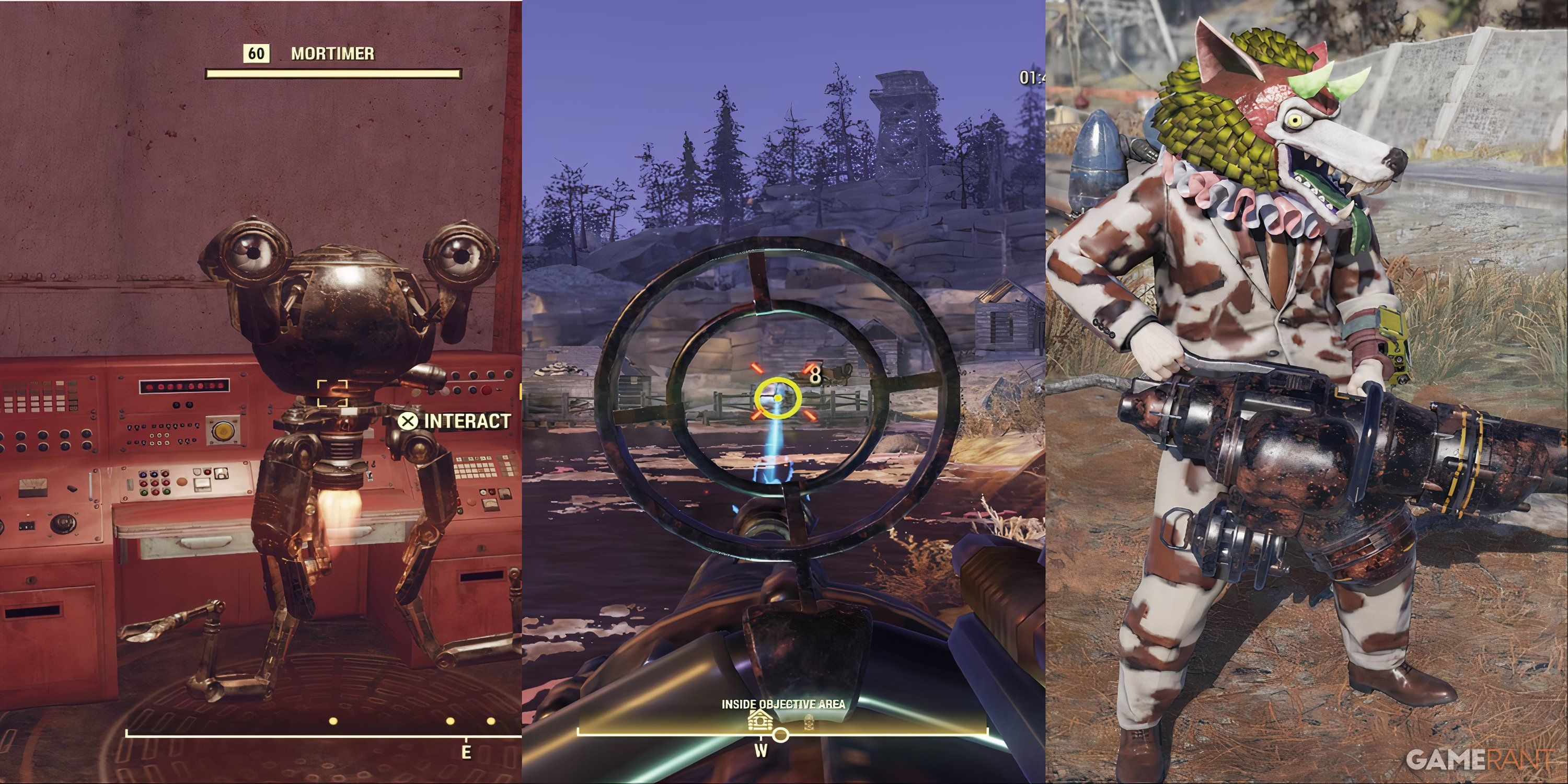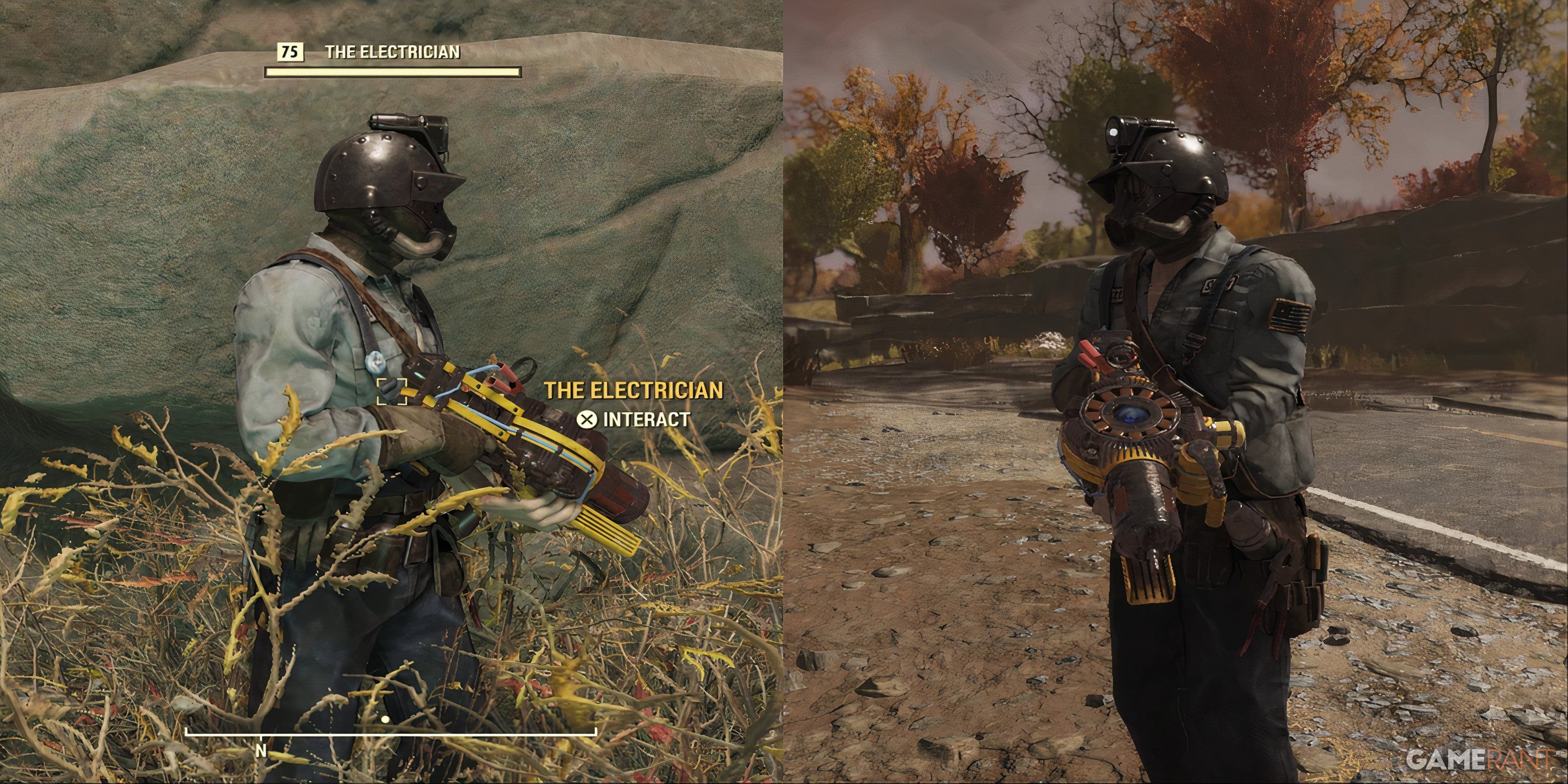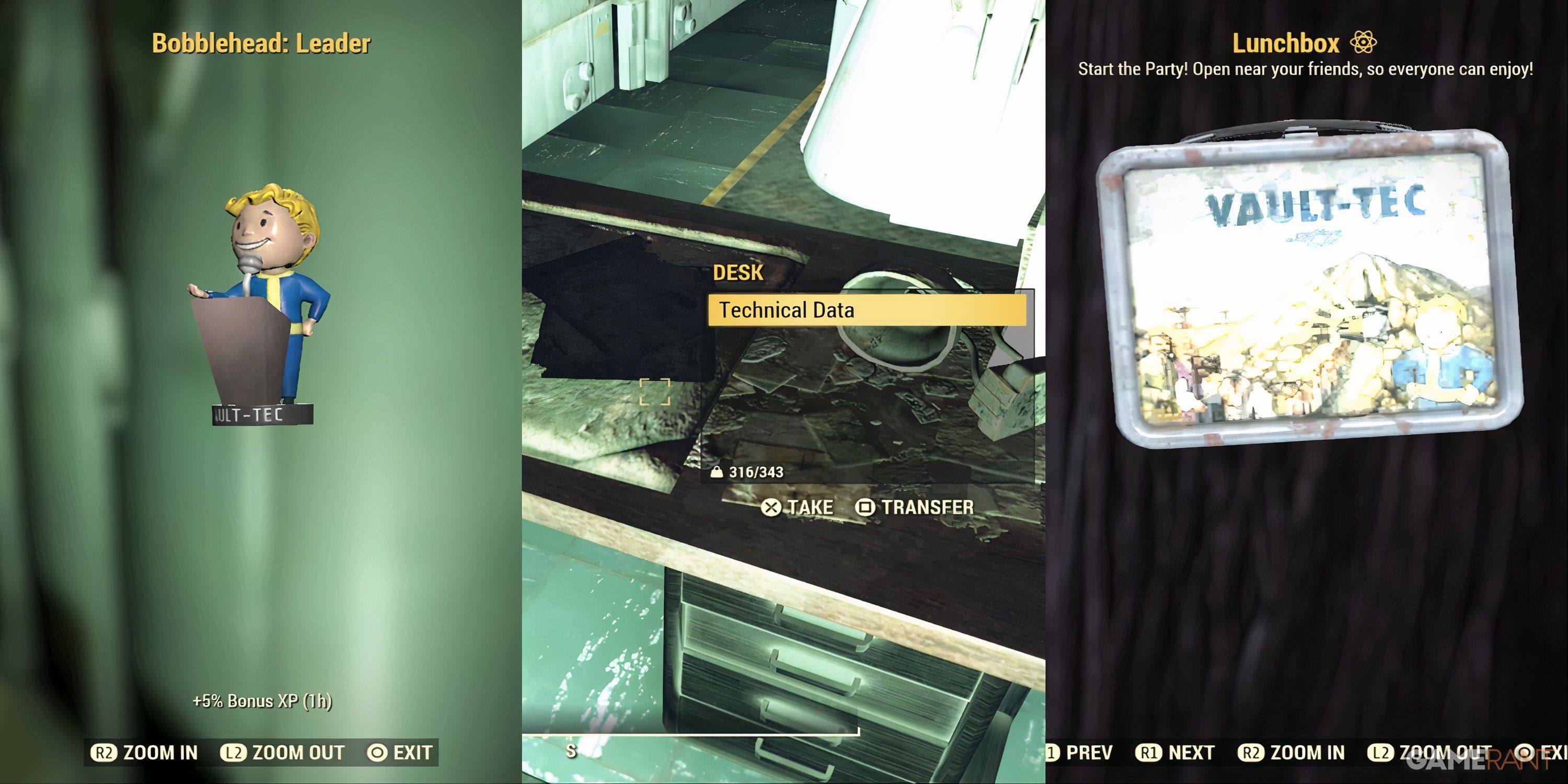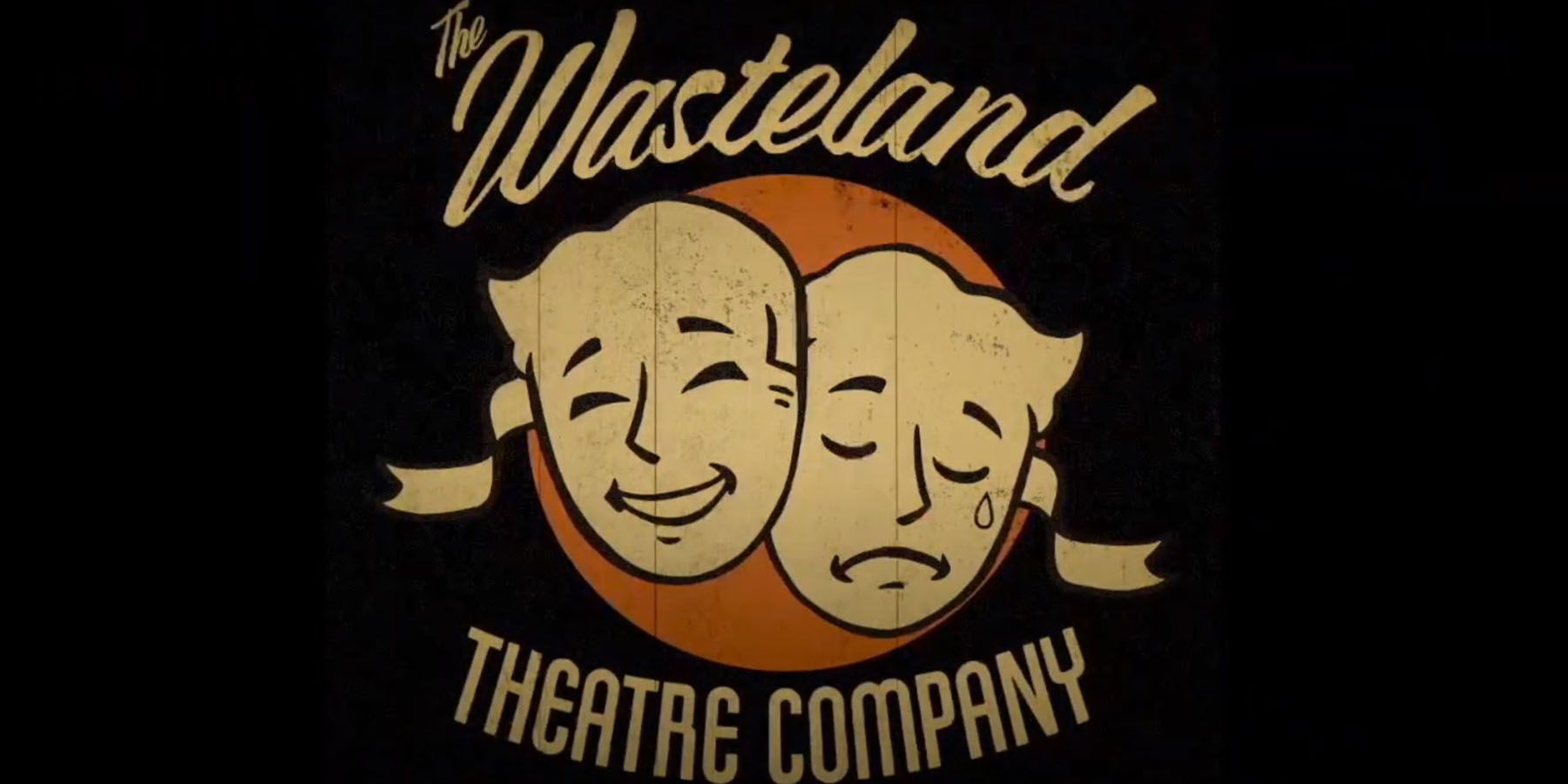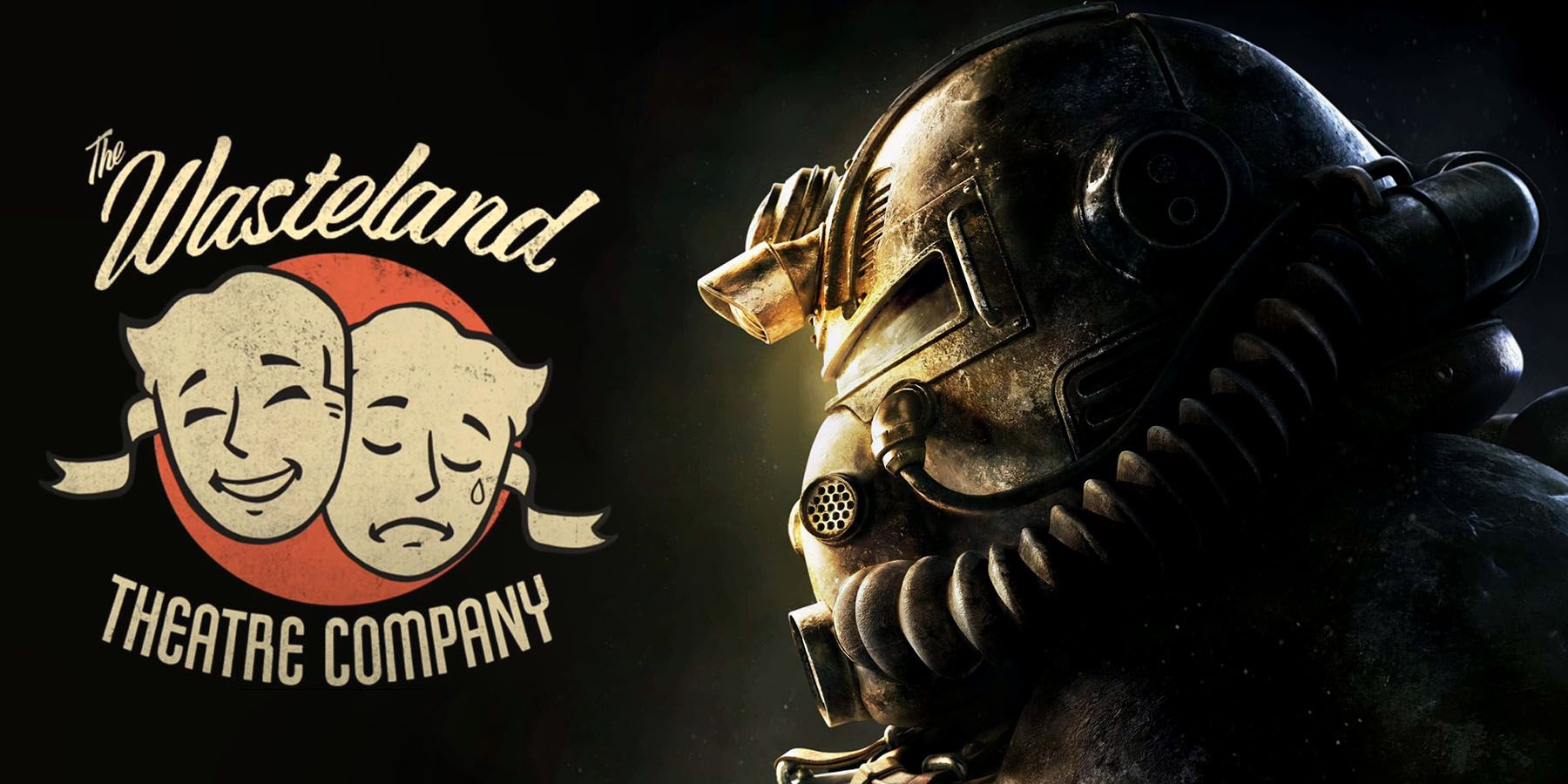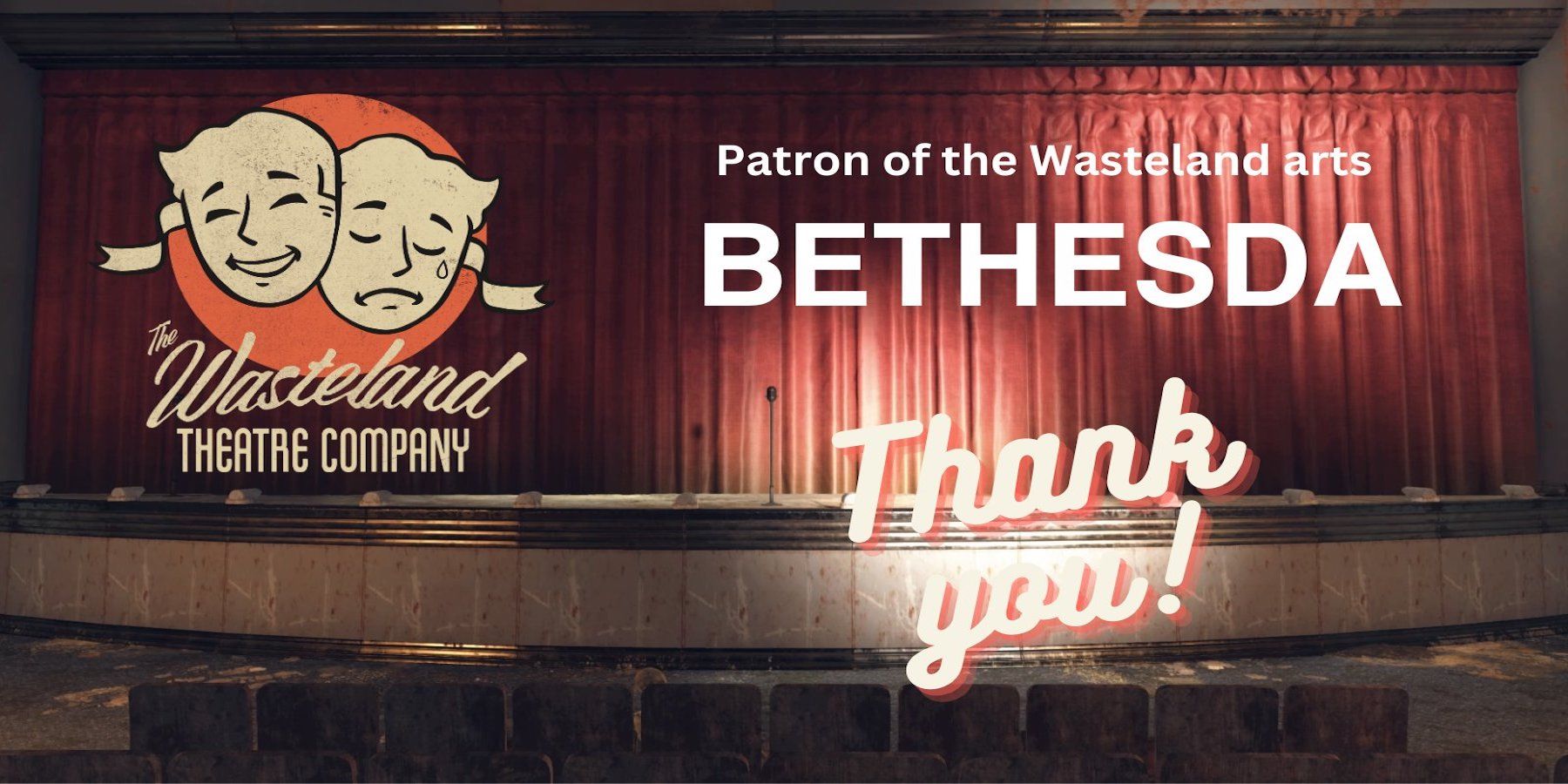The Wasteland Theatre Company is a drama troupe that stages play productions live within the popular game Fallout 76. Founded in 2021, the group performs a wide range of classic plays, primarily from the works of William Shakespeare, but also other works from playwrights like Charles Dickens and Lewis Carroll. With the aid of community streamers, the group performs their plays live on Twitch using theaters built in the Fallout 76 landscape.
In an interview with the artistic director and Founder of The Wasteland Theatre Company, Northern Harvest, Game ZXC got an inside look at how the company was formed and how it operates today. Harvest revealed details about how the company performs within the Fallout 76 world, chooses plays, and various technical aspects that make each performance successful, as well as howt the company has grown from its humble beginnings. The following transcript has been edited for clarity and brevity.
Q: Can you tell us a bit about the background of the Wasteland Theatre Company?
The Wasteland Theatre Company is a community theatre troupe performing classical theatre live, in-game, in Fallout 76. Our aim is to bring the performing arts back to life in the post-nuclear apocalyptic, retro-futuristic universe of Fallout 76. Our troupe is made up of experienced and inexperienced actors and crew who are passionate about adapting and performing theatre within the video game we all love.
Q: What inspired the Wasteland Theatre Company’s development, specifically the concept of mixing theatre with video games?
The Wasteland Theatre Company was founded in the spring of 2021, at the height of the COVID-19 pandemic. Living through a real-life global crisis drew immediate relationships to the post-nuclear apocalyptic world as well as Shakespeare’s own times. In Shakespeare’s time, the stages were shuttered due to the plague, while in our own time, they were closed due to the pandemic. For us, the birth of The Wasteland Theatre Company was natural: in our lives within the post-apocalyptic setting, as well as our real-world lives during the pandemic. When we first decided to perform a full, live play within Fallout 76 we understood immediately that what we were doing fit both the lore of the Fallout universe as well as our own pandemic reality. The arts find a way to survive crisis because the arts are an expression of our humanity.
Q: The Wasteland Theatre Company has performed a variety of plays, including Shakespearean works, Dickens, and Carroll adaptations. How do you choose which plays to perform?
We always choose classic productions, over 100 years old, primarily because they are plays that would have been known to the people within the Fallout universe, which diverts from our present timeline at some point in the 1950s. The Phantom of the Opera or The Rocky Horror Picture Show wouldn’t have existed within the Fallout timeline. Our production choices are also old enough that they are now public domain, so we can perform them without copyright restrictions. Our more recent performances are also chosen based on the themes of the plays. For example, in our production of Romeo & Juliet, we used the in-game factions of Raiders and Settlers in place of Montagues and Capulets.
There might also be an article of clothing or an item in the game that inspires which play we ultimately land on. Our upcoming production of Shakespeare’s Coriolanus was inspired, in part, by the conflict between two NPCs – Knight Shin and Paladin Rahmani, in the Brotherhood of Steel storyline within the game.
Q: Based on the most recent performance, "Alice in the Wasteland,” can you discuss how the adaptation of Lewis Carroll's Alice in Wonderland fit within the Fallout 76 world?
We used the Gerstenberg adaptation as our base because it was a mix of both stories, and we didn’t want to replicate the well-known Disney version. We kept most of the script the original Dickens text, applying Fallout changes to the characters and story. What really made our story come to life was the hard work and brilliance of our actors who really put themselves into their weird, wonderful, and chaotic roles.
Q: What has been the reception from the Fallout 76 gaming community and the wider audience to the Wasteland Theatre Company's performances?
The Fallout 76 community is an incredibly welcoming, supportive, and uplifting group of gamers. The vast majority have applauded us along as we continue to experiment and take risks in our performances. Even those early voices that were critical (wrongly claiming that ‘there is no way theatre would exist in a post-nuclear apocalyptic world’) have motivated us to try harder and push our own boundaries and comfort levels. We keep our performances real, organic, and accessible. Again, this is the Wasteland.
Q: How do you manage the technical aspects of staging and streaming a live performance? Are there any particular challenges you face in this regard?
We perform on player-built stages using in-game assets. Our stages are specially built for each play, using whatever we can to emphasize the actors and the story they are telling. The characters controlled by players don’t have facial expressions and have limited movement, so our Director Jonathan Thomas, who has real-world stage-managing experience uses stage lighting and stage blocking to emphasize who is speaking. We also use in-game movements like emotes to further draw our audience’s eye. Unlike real-world theatre, we do have to contend with the dangers of performing in the post-nuclear apocalyptic Wasteland.
We have had our dress rehearsals nuked by griefers, and have had Super Mutants, irradiated giant scorpions, and even a friendly mutated beaver interrupt our shows. We usually have a security guard assigned to deal with any non-player dangers to our shows, and we respectfully ask our cast, crew, and audience not to take out their own weapons during the performance. Again, this is the Wasteland.
Q: Could you talk about the actors and crew of the Wasteland Theatre Company? Do they come exclusively from the Fallout 76 gaming community, or do you also have actors from outside the game involved?
All our actors and crew come from the Fallout 76 community. You need to own and play Fallout 76 in order to be part of the show (you can watch us on stream if you don’t play it). Our people come from a wide range of experience levels: some have degrees in theatre, some are teachers, some are voice actors, and others are simply here to try their hand at Shakespeare in a digital performance space. We do not discriminate based on experience because we want to offer a safe, accessible, and fun space for anyone to explore the performance arts, and who knows – maybe they will venture into their own communities and try acting (or simply enjoying a show) in the real world.
Q: Are there any famous streamers or notable individuals within the Fallout 76 community who have participated as actors or crew members in the Wasteland Theatre Company?
We were blessed to have well-known role players from the Fallout Five-0 like Lucy and Ray Middelthon encourage us early on, and stream our plays on Twitch for us. Some of our actors come from various other roleplay groups like the Free States Militia and New Responders. But at the end of the day, we are happy with famous or not-so-famous folks joining our troupe, because we are here to celebrate the arts, have fun, and be vanguards in what we do.
Q: What motivates the Wasteland Theatre Company to continue producing live performances within Fallout 76?
We love what we do. Live theatre inside a video game is still a relatively new concept, and we are overjoyed thinking about how we might be contributing to the history of Shakespeare's performance. From what we know, our performances of Macbeth, Romeo & Juliet, and A Midsummer Night’s Dream were all the first time in history that these plays were performed live inside a video game. That sense of doing something historic alone really motivates us and our audiences who are witnessing these shows in this medium for the first time. This is what has turned the heads of academics and Shakespeare enthusiasts as well because it is such a novelty but also a very new medium for delivering the works of Shakespeare to audiences around the world. We will surely be in someone’s master’s thesis someday, and that brings me joy.
Q: Are there any plans for future productions from the Wasteland Theatre Company?
We are in the early stages of rehearsing for our upcoming performance of Shakespeare’s tragedy Coriolanus, a play set in the early days of the Roman Republic. In our adaptation, it is set in post-nuclear apocalyptic Appalachia. It is going to be epic, with plenty of shooting, explosions, and patronizing Shakespearean insults.
Q: How do you balance the creative freedom of adapting classic works within the Fallout 76 setting while also staying true to the original essence of the plays?
Shakespeare’s plays tell a story, and we really try to keep that story central to our production. Pivotal to that storytelling is the language and rhythm Shakespeare uses, so we do not change the performances to modern language. Our adaptations might change the setting to fit our Fallout universe, and we often carefully cut quite a bit of text as our shows generally don’t run for more than an hour. Our process of adaptation takes care not to lose the plot, but we might lose entire sections of the play we feel are not relevant or might lose our audience. Performing on public servers also means we have a limited number of people who can be on the server at once, so we do a lot of role-doubling and even merging characters altogether.
For example, in Coriolanus, we merge Volumnia, Virgilia, and young Martius into one, while hopefully not losing too much of what Shakespeare was trying to deliver. Every performance we learn something new; what works, what flops, but we enjoy every moment of it.
Q: In what ways does the Wasteland Theatre Company engage with the wider Fallout 76 community beyond the performances?
We recognize that we are part of a greater community. Our actors and crew are themselves part of other groups in the community, and we all try to support one another. There are so many brilliantly creative people in the Fallout community who put on events, including live dance parties, competitions, role play, machinima, podcasts, and more. We are really a place where all these passionate people take the time to do a Shakespeare play together outside their already busy communities and lives.
Q: Has the Wasteland Theatre Company faced any unique challenges or obstacles in its journey so far?
The biggest challenge is coordinating rehearsals, because many of us have different life schedules and live in different time zones, some of us have kids, some work evenings, and others have commitments to their own gaming communities, so I’d say that is the biggest challenge. Jonathan Thomas, our stage manager and director of our plays, takes on the tough role of trying to take what is on paper and bring it to life. He does a great job troubleshooting how to get around the limitations of the medium and deliver something our audience can understand and enjoy.
Q: Are there any collaborations or partnerships that the Wasteland Theatre Company has established with other gaming communities or organizations?
We have had moral and professional support from real-world Shakespeare troupes, including Shakespeare in the Ruins—Winnipeg, which really helped us overcome our initial hesitations. Their Artistic Director Rodrigo Beilfuss told us, ‘Shakespeare wrote for you, for people, with an open heart. Just do it’. The Folger Shakespeare Library in Washington DC has been a huge resource for us, providing play scripts, analyses, and encouragement. Recently, Bethesda provided us support via in-game currency called ‘Atoms’ to help us build our next stage, so I suppose Bethesda is our first official stage sponsor. It really means a lot to us all to have the recognition from Bethesda, because the whole idea behind Fallout 76 was to have players take control of their game and do something with it, which we certainly did. We like to say that performing Shakespeare live on-stage in Fallout 76 is the real end-game content.
Q: Looking ahead, what is the long-term vision for the Wasteland Theatre Company?
We keep learning from each of our shows, so we will continue to refine our craft, bring in new people, and have fun. There are so many more amazing Shakespeare plays to dive into, so I hope we can continue performing for audiences in-game and live-streamed for as long as we can, and who knows, maybe our work can inspire players in future MMORPGs to build their own Shakespeare troupes. We’d love to stream a performance live for future video game conferences or talk on a panel about our experience doing live theatre in a video game. Hopefully in the end we can leave a bit of a legacy within gaming as well as within the Shakespeare world. Most importantly, this journey has reintroduced a passion for theatre for most of us, and rekindled a love for the timeless works of Shakespeare. That makes it all worthwhile.
Fallout 76 is available now for PC, PS4, and Xbox One.

